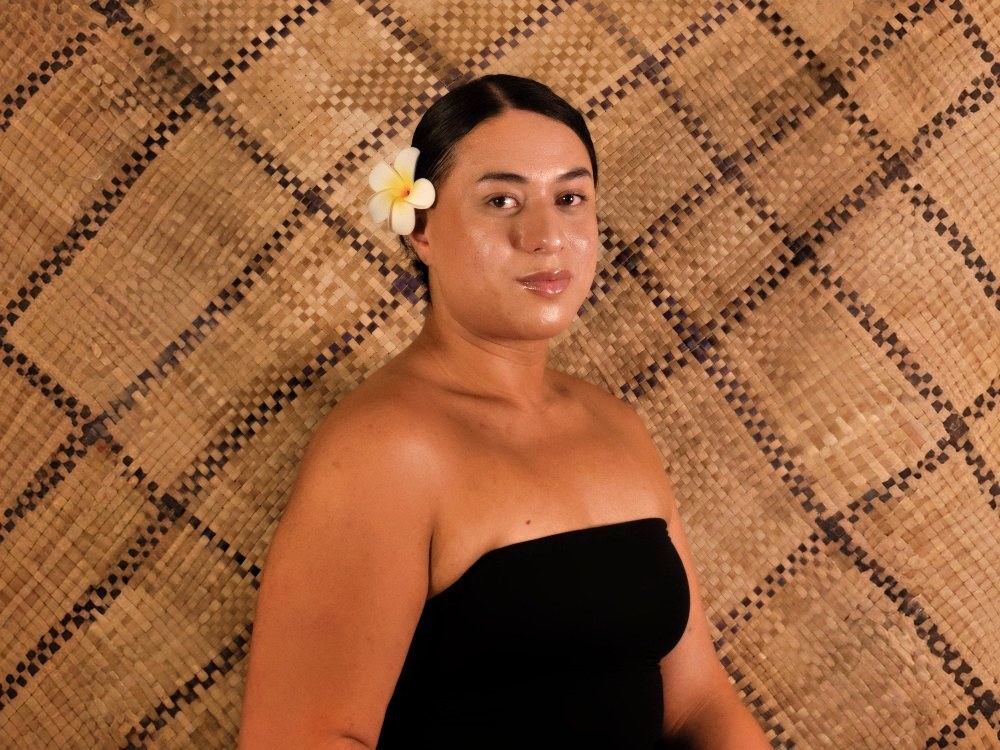Fa’afafine playwright, Hibiscus Tupua-Wilson, talks to Oliver Hall about using art, theatre, and ballroom to uplift Aotearoa’s queer Pasifika youth.
At 26, Hibiscus Tupua-Wilson is already a commanding voice in Aotearoa’s queer Pasifika arts scene. A writer, performer, and godmother of the House of Marama, she embodies the resilience of living as a fa’afafine and trans woman in contemporary New Zealand. Her life, rooted in Samoan culture and artistic expression, is a testament to the power of knowing who you are—and telling your story on your own terms.
Born and raised in Lower Hutt, Hibiscus describes her upbringing as “humbling and loving,” thanks largely to a supportive family. “I count my blessings,” she says. “I am very honoured and grateful and lucky to have a family that is supportive and who have been part of my journey since birth.” That unwavering familial acceptance has shaped how she navigates the world—and how she uplifts others who aren’t so lucky. “If you’re in a position where you have love and support, share that with those who don’t.”
Her recent stage work, WTF – WHAT THE FAʻAFAFINE!?!, drew acclaim at the 2025 Kia Mau Festival. The production grew from a solo performance in 2020 into a full ensemble piece, marking a high point in her career. It resonated with audiences through its fearless embrace of dual identity—melding the Indigenous third-gender fa’afafine with the Western identity of being a trans woman.
“I’m not one or the other,” she says. “I identify as both… one is cultural and Indigenous, one is a Westernised concept, and I’m just bridging those two identities together.” The piece wasn’t just theatre—it was healing. It brought together her chosen family, other performers of trans and queer experience, and told parts of her story she couldn’t carry alone.
But Hibiscus is clear that her purpose extends beyond the stage. Her journey as fa’afafine began in early adolescence—around age 13—when she resonated with older fa’afafine cousins and aunties. Later, around 17, she began identifying as a trans woman. “When you navigate more into your own journey, you start to reveal more layers about yourself,” she says. “That’s something I did after being firmly grounded as fa’afafine.”
There’s still confusion and misconception about what it means to be fa’afafine. Hibiscus is patient but firm: “It’s not a trans woman. It’s not a gay man. It’s not based on gender or sexuality. It’s an energy, an essence, a spiritual and cultural identity that is unique to Samoan people.” She explains that before Christian colonisation, fa’afafine were respected and celebrated. “Missionaries brought the binary and the shame,” she says. “We’re still reclaiming what was always ours.”
Today, Hibiscus lives in central Wellington, the city she calls “the capital of the arts in Aotearoa.” It’s here she has found creative and personal community, especially through her involvement in the ballroom scene. As godmother of the House of Marama, she’s helping nurture the next generation of queer Pasifika artists, many of whom find confidence and identity through performance.
“Ballroom is where I really shaped my womanhood,” she says. “It was created by Black and Latina trans women, and I always honour that. I wouldn’t be the strong woman I am today without ballroom.”
Her advice as a ‘mother’ to emerging queer Pasifika artists? “Be firm and grounded in who you are first,” she says. “Before you create something, build your foundation. Because if you present something half-formed, it dims your light and the work you want to do.”
Though she hasn’t been back to Samoa since 2016, that visit as a teenager left a deep impression. “Planting your feet in the soil of Samoa—it’s a spiritual connection. It reminded me of who I am, and where I come from.” Both her parents were born in Samoa and migrated to New Zealand in the 1980s, seeking opportunity. Now their daughter is using that opportunity to speak loudly, clearly—and with love.
Ultimately, Hibiscus Tupua-Wilson’s story isn’t just about being seen on stage. It’s about what happens when a young Samoan person is allowed to grow into their truth without shame, and then turns around to lift others up, too.
“We’re just human beings,” she says. “We want to be loved. We want to be heard. We want to be seen. We’re not challenging anyone. We’re just existing—and that should be enough.”
Follow Hibiscus on Instagram @hibiscus.xo


































